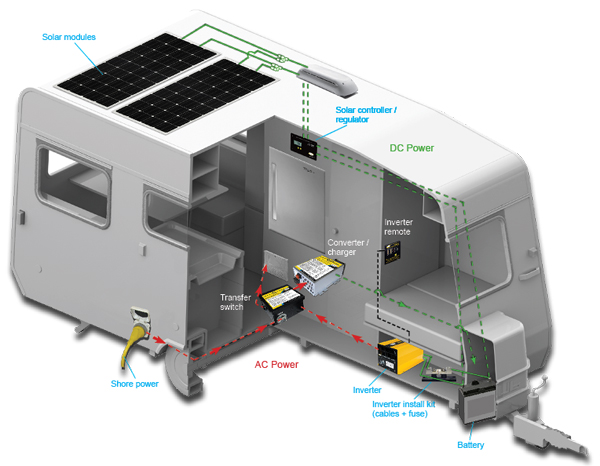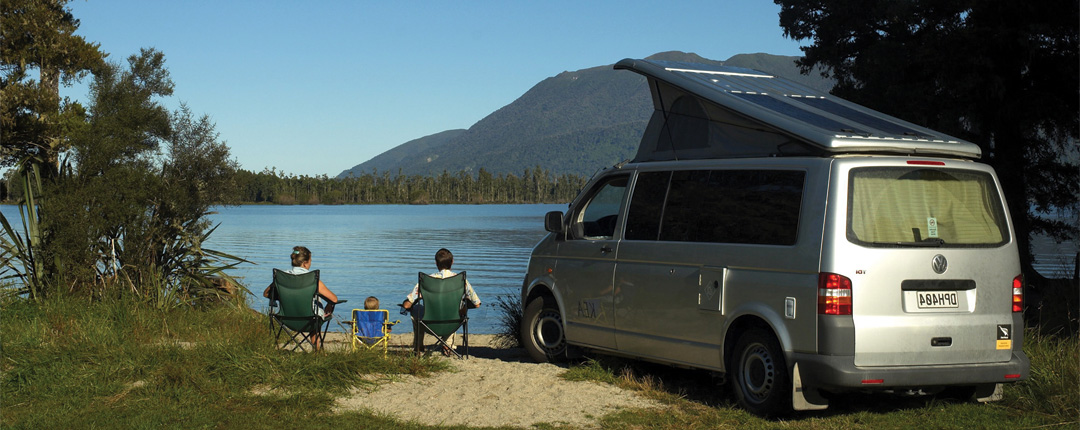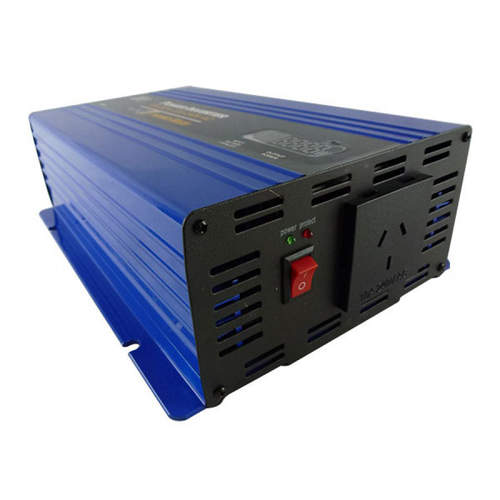Solar Power
THE BENEFITS OF SOLAR POWER
Save money on fuel
A solar-recharged battery system offers the freedom to run lights, refrigerators, fans and electronics anywhere the sun shines – even remote locations. Depending on your power needs you could spend most of your time without ever having to turn on a diesel generator or pay for shore power. You will not only save money on the actual generator, but also spare many trips to the gas station. Every day you'll spend off the power cord will save you money.
A clean, quiet and affordable mobile power source
Solar panels give you access to unlimited, renewable and safe source of energy. While solar is not the most powerful choice when compared to using a generator, it is superior in the fact that it works without requiring any fuel except sunlight. Solar panels are a quiet alternative to generators. Solar power is silent and will keep your environment peaceful.
Long lifespan and low maintenance
Solar power systems ask for very little maintenance after installation and they have long lifespan. Solar will charge and maintain your battery both on and off the road, ensuring healthy and long-battery life. A solar kit or system allows you to have plenty of 'fuel' when you need it.
HOW DOES SOLAR POWER WORK WITH RVs
Solar takes the sun's energy and converts it into DC (Direct Current) battery power to charge you motorhome’s batteries. It is a battery charger that works anytime the sun is out. The battery stores the current as amperage, similar to a gas tank storing gasoline. The battery power may be used at any time to operate devices connected to the battery.

BASIC SOLAR POWER KIT COMPONENTS
Solar Panel(s):
A solar panel is an series of interconnected silicone cells joined together to form a circuit. Cells make up a module, modules make up a panel, multiple panels make up an array. A PV Array (photovoltaic array) is a complete power generating unit. It captures energy from sunlight and passes it through to the charge controller which then feeds it at just the right current to your batteries. The purity and construction are what determine the efficiency and cost of the cell and therefore the panel.
As photovoltaic (PV) technology continues to improve, the efficiency of this process is increasing. Many panels operate with a range of 10-15% efficiency. The latest technologies used in high end applications can reach 21% efficiency. This relatively low efficiency combined with unreliable sun exposure is the reason it takes many panels to create relatively small amounts of usable energy.
The number of hours that a panel is exposed to the suns energy that is most important, not how hot it gets. In fact the hotter a solar panel gets, the less power it will provide.
Charge Controller:
The solar panel produces the power from sunlight. The charge controller limits the flow of current and keeps the solar panel from overcharging the batteries. Many of the models also will let you set the proper charge algorithm for your battery type. The Charge Controller adjust charging rates depending on the battery’s charge level to allow charging closer to the battery’s maximum capacity as well as monitor battery temperature to prevent overheating.
Deep Cycle Battery:
This is your Solar system power tank. It is rated in Amp Hours. Your RV consumes these Amp Hours when running various electrical devices such as lights, water pumps, fridge, furnace fans,… By topping up the battery with solar, you ensure that it remains healthy and plenty of power is available when you need it.
The level of power in your batteries is very improtant. Having the biggest and best solar panels on your roof is useless if you don’t have the capacity to capture and store that energy.
• A fully charged battery will show a voltage reading of 12.6V to 12.8V depending on battery type. A reading of 12V or below (50% charged) is damaging your battery.
• A battery will naturally discharge over time and the rate of discharge increases in warmer weather.
• A battery left partially discharged for just a week can be difficult to fully charge as sulphation occurs and the build up on the plates becomes harder to break down with time.
• A constant 8 hour drive will only charge your battery up to 75%. To fully charge a battery you should plug into mains at least overnight.
• Think of your battery as you would a piggy bank – if you are taking more out than what goes in, you will run out.
A well maintained battery should last at least 5 years and up to 10. A good solar system will improve a batteries life with power constantly going in but you will still need to charge on mains power on a regular basis.
EXTENDED SOLAR POWER SET UP
Power Inverter:
The power generated by solar panels is always DC power. It is stored in your battery as DC power. It is directly accessible and available for appliances designed to operate on 12v DC current. However, many appliances require 220v AC (Alternative Current) power (like in your house). The inverter is going to convert DC power into AC power and allow you to run larger appliances such as microwave oven, TV, etc.
Inverter switch:
Inverters continually draw power from your battery while they are on. Best practice is to turn them off when not requiring AC power. A small remote switch is ideal to turn off the inverter with ease.
AC Breaker panel:
The output of the transfer switch connects to an AC Breaker Panel providing power to the AC outlets. Your RV will surely be already equipped with an AC Breaker panel.
If you want to set up the kit yourself, you’ll also need to look for mounting brackets, wire, fuse, bolts and nuts, sealant …
If you’re not an expert handyman we recommend you to book in your vehicle with our Service Centre.
Book your Solar Power Kit installation
HOW TO SELECT YOUR SOLAR POWER SYSTEM COMPONENTS
There is no one-size-fits-all solar power system. Everyone's needs are different. Here are a few questions you need to ask yourself when you decide to go solar:
- what sort of motohomedo you own; is there plenty of unshadowed, even roof space?
- what are the appliances you have and use in your motorhome?
- how long do you want to be able to freedom camp at any one time?
- how often are you happy to go to a shore power plug and recharge overnight?
- What size is your existing battery bank; is it performing well or are you regurlarly running out of power?
- Will you freedom camp over Winter?
DOWNLOAD OUR DAILY ENERGY CONSUMPTION CALCULATOR (.xls)
Book your Solar Power Kit installation
SOLAR PANEL MAINTENANCE
Solar panels are most effective when clean and free of damage. They can be washed using a mild detergent.
.jpg)









